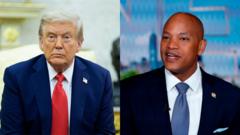In a surprising turn of events, a ban imposed on wigs, hair extensions, and skin-lightening products at Dakar’s Grand Théâtre sparked an immediate and intense reaction from the public, leading to its swift reversal. This internal memo, issued by Serigne Fall Guèye, the director of the theatre and a known figure in Senegal's ruling party, aimed to promote Pan-African values and cultural authenticity. However, it soon became a flashpoint for broader discussions about gender roles and identity politics in Senegal.
Critics swiftly condemned the ban as a means of controlling women's expression under the guise of protecting cultural pride. Many saw it as an extension of pervasive gender inequalities, particularly in light of criticisms regarding the lack of women's representation in President Bassirou Diomaye Faye's administration, where only four out of twenty-five members are women. The outrage was further compounded by the elimination of the Ministry of Women, highlighting a significant regression in gender equity in governance.
Social media erupted with backlash as many noted the irony of policing women's bodies while neglecting systemic inequalities. Political analysts pointed to a deeper power struggle, where cultural institutions are leveraged to assert specific identities that marginalize those who do not conform. Feminist voices, such as public intellectual Henriette Niang Kandé, raised questions about the implications of such aesthetic regulations, framing them as an infringement on personal choice.
While supporters of the ban claimed it was a move to restore African dignity, critics argue that genuine cultural affirmation requires addressing significant issues such as economic justice, education, and language. Sociologist Mame Diarra Thiam emphasized the need to focus on deeper systemic improvements rather than superficial measures aimed at enforcing a particular image.
As public pressure mounted, Guèye retracted the ban, citing misunderstanding rather than a failure of intent. Nonetheless, the episode revealed a growing discord among urban youth and progressive civil society who had previously supported the ruling party but now express disillusionment with the government's conservative turns.
This controversy surrounding the Grand Théâtre illustrates that discussions on appearance intersect profoundly with concepts of cultural authenticity, power, and personal freedom. The ban may have been lifted, but the conversations it initiated regarding identity, gender, and the implications of beauty standards continue to resonate across Senegal's social fabric.
Critics swiftly condemned the ban as a means of controlling women's expression under the guise of protecting cultural pride. Many saw it as an extension of pervasive gender inequalities, particularly in light of criticisms regarding the lack of women's representation in President Bassirou Diomaye Faye's administration, where only four out of twenty-five members are women. The outrage was further compounded by the elimination of the Ministry of Women, highlighting a significant regression in gender equity in governance.
Social media erupted with backlash as many noted the irony of policing women's bodies while neglecting systemic inequalities. Political analysts pointed to a deeper power struggle, where cultural institutions are leveraged to assert specific identities that marginalize those who do not conform. Feminist voices, such as public intellectual Henriette Niang Kandé, raised questions about the implications of such aesthetic regulations, framing them as an infringement on personal choice.
While supporters of the ban claimed it was a move to restore African dignity, critics argue that genuine cultural affirmation requires addressing significant issues such as economic justice, education, and language. Sociologist Mame Diarra Thiam emphasized the need to focus on deeper systemic improvements rather than superficial measures aimed at enforcing a particular image.
As public pressure mounted, Guèye retracted the ban, citing misunderstanding rather than a failure of intent. Nonetheless, the episode revealed a growing discord among urban youth and progressive civil society who had previously supported the ruling party but now express disillusionment with the government's conservative turns.
This controversy surrounding the Grand Théâtre illustrates that discussions on appearance intersect profoundly with concepts of cultural authenticity, power, and personal freedom. The ban may have been lifted, but the conversations it initiated regarding identity, gender, and the implications of beauty standards continue to resonate across Senegal's social fabric.



















